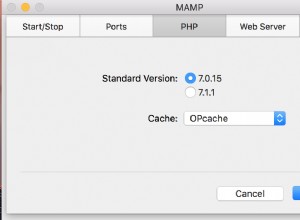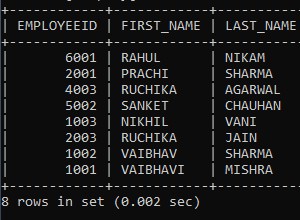Aqui está um exemplo simplificado que fiz para uma pergunta relacionada ao desempenho semelhante há algum tempo que aproveita os índices de chave primária clusterizada innodb (obviamente disponível apenas com innodb !!)
- https://dev.mysql. com/doc/refman/5.0/en/innodb-index-types.html
- http:/ /www.xaprb.com/blog/2006/07/04/how-to-exploit-mysql-index-optimizations/
Você tem 3 tabelas:category, product e product_category da seguinte forma:
drop table if exists product;
create table product
(
prod_id int unsigned not null auto_increment primary key,
name varchar(255) not null unique
)
engine = innodb;
drop table if exists category;
create table category
(
cat_id mediumint unsigned not null auto_increment primary key,
name varchar(255) not null unique
)
engine = innodb;
drop table if exists product_category;
create table product_category
(
cat_id mediumint unsigned not null,
prod_id int unsigned not null,
primary key (cat_id, prod_id) -- **note the clustered composite index** !!
)
engine = innodb;
A coisa mais importante é a ordem da chave primária composta agrupada product_catgeory como consultas típicas para este cenário sempre lideram por cat_id =x ou cat_id em (x,y,z...).
Temos 500 mil categorias, 1 milhão produtos e 125 milhões Categorias de Produtos.
select count(*) from category;
+----------+
| count(*) |
+----------+
| 500000 |
+----------+
select count(*) from product;
+----------+
| count(*) |
+----------+
| 1000000 |
+----------+
select count(*) from product_category;
+-----------+
| count(*) |
+-----------+
| 125611877 |
+-----------+
Então, vamos ver como esse esquema funciona para uma consulta semelhante à sua. Todas as consultas são executadas a frio (após a reinicialização do mysql) com buffers vazios e sem cache de consulta.
select
p.*
from
product p
inner join product_category pc on
pc.cat_id = 4104 and pc.prod_id = p.prod_id
order by
p.prod_id desc -- sry dont a date field in this sample table - wont make any difference though
limit 20;
+---------+----------------+
| prod_id | name |
+---------+----------------+
| 993561 | Product 993561 |
| 991215 | Product 991215 |
| 989222 | Product 989222 |
| 986589 | Product 986589 |
| 983593 | Product 983593 |
| 982507 | Product 982507 |
| 981505 | Product 981505 |
| 981320 | Product 981320 |
| 978576 | Product 978576 |
| 973428 | Product 973428 |
| 959384 | Product 959384 |
| 954829 | Product 954829 |
| 953369 | Product 953369 |
| 951891 | Product 951891 |
| 949413 | Product 949413 |
| 947855 | Product 947855 |
| 947080 | Product 947080 |
| 945115 | Product 945115 |
| 943833 | Product 943833 |
| 942309 | Product 942309 |
+---------+----------------+
20 rows in set (0.70 sec)
explain
select
p.*
from
product p
inner join product_category pc on
pc.cat_id = 4104 and pc.prod_id = p.prod_id
order by
p.prod_id desc -- sry dont a date field in this sample table - wont make any diference though
limit 20;
+----+-------------+-------+--------+---------------+---------+---------+------------------+------+----------------------------------------------+
| id | select_type | table | type | possible_keys | key | key_len | ref | rows | Extra |
+----+-------------+-------+--------+---------------+---------+---------+------------------+------+----------------------------------------------+
| 1 | SIMPLE | pc | ref | PRIMARY | PRIMARY | 3 | const | 499 | Using index; Using temporary; Using filesort |
| 1 | SIMPLE | p | eq_ref | PRIMARY | PRIMARY | 4 | vl_db.pc.prod_id | 1 | |
+----+-------------+-------+--------+---------------+---------+---------+------------------+------+----------------------------------------------+
2 rows in set (0.00 sec)
Então isso é 0,70 segundo frio - ai.
Espero que isto ajude :)
EDITAR
Tendo acabado de ler sua resposta ao meu comentário acima, parece que você tem uma das duas opções a fazer:
create table articles_to_categories
(
article_id int unsigned not null,
category_id mediumint unsigned not null,
primary key(article_id, category_id), -- good for queries that lead with article_id = x
key (category_id)
)
engine=innodb;
ou.
create table categories_to_articles
(
article_id int unsigned not null,
category_id mediumint unsigned not null,
primary key(category_id, article_id), -- good for queries that lead with category_id = x
key (article_id)
)
engine=innodb;
depende do seu típico consultas sobre como você define seu PK clusterizado.




